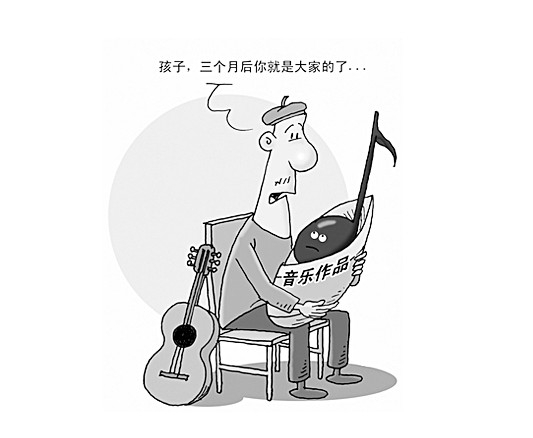(单词翻译:单击)

America’s Supreme Court delights online retailers and appals media firms
联邦最高法院判决——有人欢喜有人忧
CALL it academic arbitrage. Supap Kirtsaeng, a Thai student who earned a PhD in mathematics from the University of Southern California, made as much as $1.2m with some basic maths. He asked friends and family to ship him cheap textbooks from Thailand, which he sold for a handsome profit in America. The books were intended only for sale in Thailand, and Wiley, a publisher of some of the textbooks he sold, sued him for copyright infringement in September 2008 and won. Mr Kirtsaeng appealed, and the case made its way to America’s highest court.
Supap Kirtsaeng 是一名泰国学生,在美国南加州大学取得了数学博士学位,然而他仅靠简单的算术便赚得了120万美金。Supap Kirtsaeng让朋友和家人从泰国寄来廉价的课本,再在美国高价卖出,所得利润丰厚,可以称之为是“学术套利”。Supap Kirtsaeng卖出的课本原本只限于泰国境内出售,因此,他所售课本的出版商之一,约翰威立父子出版公司,在2008年9月以侵犯版权为名对Supap Kirtsaeng提起诉讼,并打赢了官司。之后,Supap Kirtsaeng提出上诉,该案便一路打到了美国联邦最高法院。
On March 19th the Supreme Court ruled that American copyright law does not restrict goods produced abroad from being resold in America. The ruling,widens the reach of the “first sale doctrine”, which gives copyright-holders control of their goods until their first sale; afterwards the purchaser can lend or peddle them for whatever price he chooses. Previously, the first-sale doctrine protected copyright-holders from their works being imported and resold without their permission. A retailer could legally sell a second-hand “Gone with the Wind” DVD, but could not buy it cheaply in Russia, bring it to America and sell it for a low price. With the Supreme Court’s ruling, that protection has been swept away.
今年的3月19日,联邦最高法院做出判决,宣布美国版权法不限制国外购进的产品在美国再次出售,扩大了“首次销售原则”的适用范围(“首次销售原则”规定,版权所有者在首次销售前对产品享有控制权;首次销售后,购买者则可以以任意价格租借或贩卖所购产品。)之前“首次销售原则”的规定是,不经版权所有者许可,不得从他国进口并再次销售其产品,这在一定程度上对版权所有者进行了保护。对于零售商来说,售卖二手的《乱世佳人》DVD是合法的,但他们却不能从俄罗斯低价买进这一DVD,进口至美国,再以低于美国市价的价格卖出。然而,在联邦最高法院的这次判决之后,版权所有者将失去这一层法律保护。
Publishers, record labels, film studios and other content-owners are shocked. They have often sold the same product in poorer countries for less, knowing that it would not hurt their pricing power at home. Now it will. Big online retailers such as Amazon and eBay could start exploiting these pricing differences on a large scale. Ian Whittaker of Liberum Capital, a broker, thinks this ruling will really hurt academic publishers, such as Pearson (a part-owner of The Economist). They tend to sell identical books for eye-watering prices in America and much less in countries where people cannot afford those prices.
包括出版商、唱片公司、电影制片厂在内的一众版权所有者大为震惊。之前,这些公司一贯在较为贫穷的国家降低产品价格,知晓这样做并不会损害其在本国的定价权。然而现在,这种降价策略将对这些公司在美国的定价权产生直接影响。如亚马逊和eBay这样的大型网上零售商很可能会开始利用国际间的价格差大规模牟利。伦敦投行Liberum Capital的股票经纪人Ian Whittaker认为,联邦最高法院的这一判决将损害培生教育出版集团(The Economist股东之一)等学术出版商的利益。这是因为,学术出版商所售课本在美国通常标价极高,但在那些无力承受高价的国家,课本定价则会大为降低。
Publishers have already warned that they may have to turn the page on the old system of letting students in poor countries buy textbooks cheaply. “Some people are predicting a world where price discrimination will no longer be possible,” says Arti Rae, a professor of law at Duke University. Media companies could choose to stagger the release of films or books across countries, delaying the launch of titles in countries where they cannot fetch high prices. However, that may simply encourage piracy. Congress could intervene and rejig 调整 更改 the Copyright Act of 1976, which established the first-sale doctrine. But that would require Washington to get its act together 齐心协力—a plotline so implausible that it would make J.K. Rowling blush.
对此,出版商们已经做出了警告,表示他们或许要迫于压力结束让贫穷国家学生低价购买课本的历史了。杜克大学的法学教授Arti Rae表示:“有人认为,今后价格歧视将不复存在。”媒体公司可以控制电影或图书在不同国家的发布时间,在那些无法卖出高价的国家推迟产品投放市场的时间。然而,这样做可能只会让盗版行为更加猖獗。国会可以介入此事,对1976年版权法案(该法案确立了“首次销售原则”)进行调整,解决媒体公司所面临的困境,但是要达成此事恐怕需要联邦政府各方面齐心协力,这种事情估计连写奇幻小说的J??K??罗琳都觉得不可能发生吧。
In any case, an even bigger copyright issue is brewing. The Copyright Act was written before digital media became popular, and the first-sale doctrine does not apply to electronic wares. Should consumers have the right to lend and sell their music files and e-books, even though they do not wear out like their physical counterparts, or should content-producers retain the copyright? If consumers could legally resell their electronic media, it could wipe out the profits of many media firms. ReDigi, a firm that enables people to buy and sell second-hand electronic music files, was sued last year for copyright infringement by Capitol Records, a music label. A judge should rule on the case soon, but it may well be appealed all the way to the Supreme Court.
总之,一场更大的版权问题即将到来。1976年撰写版权法案时,数字媒体大流行的时代还没有到来,而“首次销售原则”也不适用于电子产品。在电子媒体产品不会像实体媒体产品一样耗损老化的情况下,消费者是否有权租赁、出售他们的音乐文件夹和电子书?而内容出版者又是否应当保有他们的版权呢?如果消费者有权转售他们的电子媒体产品的话,很多媒体公司的盈利空间将不复存在。唱片商Capitol Records去年以侵犯版权为名起诉了ReDigi公司,而ReDigi公司正是允许人们购买、出售二手电子音乐的。负责该案的法官不日便会做出判决,但这一案件可能会像Supap Kirtsaeng案一样,一路打到联邦最高法院去。


